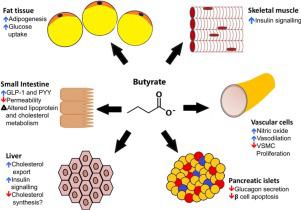Pharmacological Research ( IF 9.1 ) Pub Date : 2020-08-27 , DOI: 10.1016/j.phrs.2020.105174
Stephanie C Bridgeman 1 , Wendy Northrop 1 , Phillip E Melton 2 , Gaewyn C Ellison 1 , Philip Newsholme 1 , Cyril D S Mamotte 1

|
Metabolic syndrome (MetS) and the associated incidence of cardiovascular disease and type 2 diabetes represents a significant contributor to morbidity and mortality worldwide. Butyrate, a short-chain fatty acid produced by the gut microbiome, has long been known to promote growth in farmed animals and more recently has been reported to improve body weight and composition, lipid profile, insulin sensitivity and glycaemia in animal models of MetS. In vitro studies have examined the influence of butyrate on intestinal cells, adipose tissue, skeletal muscle, hepatocytes, pancreatic islets and blood vessels, highlighting genes and pathways that may contribute to its beneficial effects. Butyrate’s influences in these cells have been attributed primarily to its epigenetic effects as a histone deacetylase inhibitor, as well as its role as an agonist of free fatty acid receptors, but clear mechanistic evidence is lacking. There is also uncertainty whether results from animal studies can translate to human trials due to butyrate’s poor systemic availability and rapid clearance. Hitherto, several small-scale human clinical trials have failed to show significant benefits in MetS patients. Further trials are clearly needed, including with formulations designed to improve butyrate’s availability. Regardless, dietary intervention to increase the rate of butyrate production may be a beneficial addition to current treatment. This review outlines the current body of evidence on the suitability of butyrate supplementation for MetS, looking at mechanistic effects on the various components of MetS and highlighting gaps in the knowledge and roadblocks to its use in humans.
中文翻译:

肠道微生物群产生的丁酸盐及其在代谢综合征中的治疗作用。
代谢综合征 (MetS) 以及心血管疾病和 2 型糖尿病的相关发病率是全球发病率和死亡率的重要因素。丁酸盐是一种由肠道微生物群产生的短链脂肪酸,长期以来一直被认为可以促进养殖动物的生长,最近有报道称,丁酸盐可以改善 MetS 动物模型的体重和成分、血脂、胰岛素敏感性和血糖。体外研究已经检查了丁酸盐对肠细胞、脂肪组织、骨骼肌、肝细胞、胰岛和血管的影响,突出了可能有助于其有益作用的基因和途径。丁酸盐在这些细胞中的影响主要归因于其作为组蛋白脱乙酰酶抑制剂的表观遗传效应,以及其作为游离脂肪酸受体激动剂的作用,但缺乏明确的机制证据。由于丁酸盐的全身可用性差且清除速度快,因此动物研究的结果是否可以转化为人体试验也存在不确定性。迄今为止,一些小规模的人体临床试验未能显示出对 MetS 患者的显着益处。显然需要进一步的试验,包括使用旨在提高丁酸盐可用性的配方。而不管,增加丁酸盐生成率的饮食干预可能是对当前治疗的有益补充。这篇综述概述了目前关于补充丁酸盐对 MetS 的适用性的证据,研究了对 MetS 各种成分的机械影响,并强调了知识上的差距和其在人类中使用的障碍。

































 京公网安备 11010802027423号
京公网安备 11010802027423号